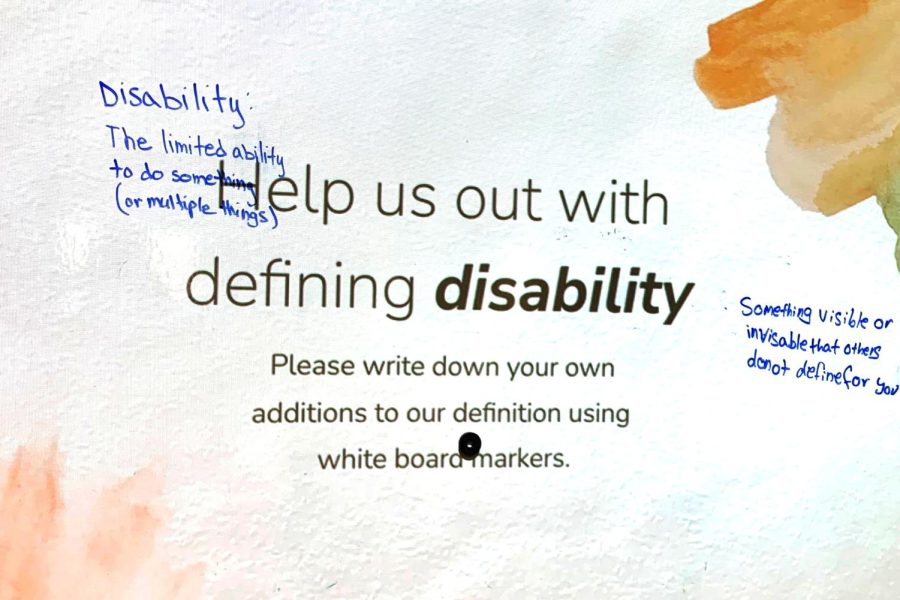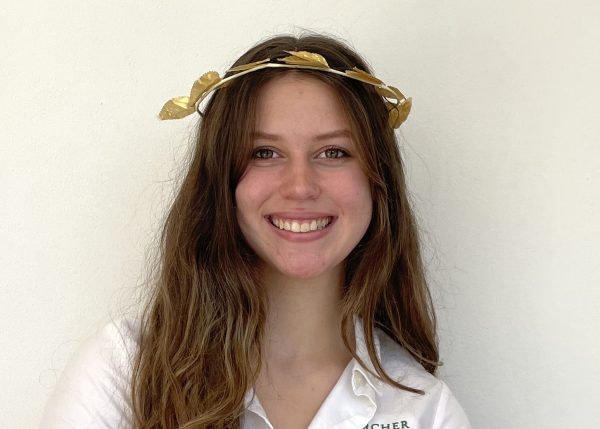Disabled Student Union creates student-led support system for people with disabilities
Photo credit: Piper Rutman
Disabled Student Union club members write on the board and discuss the meaning of the words “disability” and “disabled” and the weight these terms carry during DSU’s first club meeting. Co-founders Piper Rutman (’23) and Coco Greene (’23) held the meeting Thursday, March 2, during lunch.
March 9, 2023
Throughout their experience at Archer, seniors Piper Rutman and Coco Greene wished for student-led support for people with disabilities. In their final year of high school, they introduced the affinity group Disabled Student Union, which they hope will have a lasting impact on Archer students.
The co-founders held the first DSU club meeting during lunch Thursday, March 2, in science teacher Melissa Sharp’s room. The club provides students with disabilities or impairments a safe space to share and connect with others who have similar experiences. People without disabilities are also encouraged to join to learn more about the community’s stories and ways to support them.
The introductory meeting focused on the meaning of the term “disability,” and 10 participants attended to discuss its weight and alternate options for the club’s title. Director of Academic Access Catie Chase is the club adviser. She said that the word “disabled” tends to carry a negative connotation, and the Disabled Student Union may be on the road to a new title.
“We were talking about how important language is and how it’s impactful,” Chase said. “Should we call it disability, learning differences or neurodiversity to align with the movement of being inclusive and welcoming? Sometimes the word disability has a negative stigma.”
Initially, Rutman and Greene said they decided on the name Disabled Student Union in order to reclaim the meaning of the term “disabled” for their group. They are now in the process of coming up with a broader term to be more inclusive to diverse identities within the community of people with disabilities.
“Piper and I wanted to reclaim the word because I still like it, but a lot of people felt uncomfortable with it,” Greene said. “I think we’re going to change it to something broader, so people feel welcome because it’s a very heavy word.”
Greene has been interested in spreading awareness about people with disabilities since her sophomore year, when she held Zoom meetings where people with disabilities could share their stories. She said the lack of discussion about disabilities inspired her to create a space where people talk openly about their own disabilities or become allies. Greene spoke about her experience at Archer as someone who is neurodivergent and how she wishes she had access to a support group like DSU early on in her school environment.
“I’m epileptic and a medical anomaly. I was diagnosed when I was 6,” Greene said. “It’s lonely because you don’t know anyone else who’s disabled because no one talks about it. I always remember, in middle school, I was so ashamed to tell anyone. I didn’t want anyone to know, and I felt so bad about myself for being disabled or having epilepsy. I don’t want other people to feel that way.”
Due to COVID-19 during her sophomore year, Greene reached out to the community through Zoom in an effort to provide a space for students with or without impairments to come and connect with one another. However, this was during a time when human interaction was extremely minimal, so the interest in Zoom meetings was low. Returning back to in-person learning gave her an opportunity to reintroduce the idea of an affinity group for people with disabilities to the Archer community.
“DSU has always existed at Archer, but sometimes a student club will transform, as it should with a new year and new students. Post-pandemic, it’s taken a while to get ourselves up and running. Now, it’s our second year back in-person at Archer,” Chase said. “I was so grateful that Piper and Coco initiated this student-led organization once again.”
Rutman felt similarly to Greene about the importance of having an affinity group for the disabled community. Rutman said she is determined to ensure that DSU will be a space where people are seen and heard, and it will help students come to realize they are not alone.
“Personally, I have both neurodiversity and physical impairments. It’s a big deal for me just to see that there are so many other people in the same boat,” Rutman said. “I think especially for younger kids, it’s great to have that support system of people your age.”









